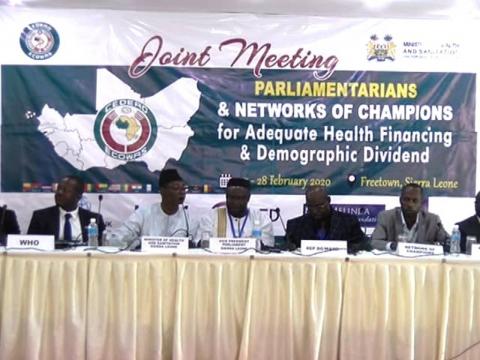By Francis H. Murray
The West African Health Organization (WAHO) and it partners have concluded a two-day conference on adequate health financing and universal health care in Freetown.
The joint meeting of the Parliamentarian National Implementation Monitoring Committees (NMC) and the Network of Champions for Adequate Health Financing and Demographic Dividend (NOCAHF-DD) in West Africa was convened from February 27 to 28 at the Bintumani Hotel.
According to the Chairman of the NOCAHF-DD, Zekpa Apote Tovinyeawu, the conference was meant to further ongoing discussions and assess the progress achieved so far by the 15-member countries of the Economic Community of West African States (ECOWAS) that pledged commitments to allocate at least 15% of their annual national budget to improve their health sectors.
WAHO is the health agency of ECOWAS, which is a sub-regional bloc meant to ensure political and economic integration of the region.
The Freetown meeting followed a high level advocacy meeting held in Ouagadougou, Burkina Faso in 2017 for Speakers of the National Assemblies of the ECOWAS countries, on the need to urgently pledge increased domestic health financing as well as take necessary steps to achieve the economic benefits of the demographic dividend through the adoption of appropriate policies.
Speaking on behalf of the Director General of WAHO, Ali Sani, Planning Officer for the organization, noted that the composition of the conference was enough testimony of the great importance attached to the issues of adequate financing and demographic dividend. He also praised the participants’ willingness to work and resolve critical issues and challenges.
Chairman of the Inter-Parliamentary Committee, who also doubles as Chairman for the Commission of the Committee of Finance of the Republic of Benin, Gbenonchi Gerard, noted that a number of decisions and commitments were made by member states to dedicate 15% of their national budget which was yet to be achieved.
“A number of plans are on the way to improve the health conditions of our citizens in the Sub-region,” he noted, adding that Benin is not only committed to ensuring that this goal was achieved, but that it was also taking the lead.
Country Representative, World Health Organization (WHO), Evans Majani Liyosi, lauded the idea which he said was geared towards making quality healthcare accessible to everybody in their respective countries.
‘‘Demand for healthcare is growing in our countries with our government’s desire to provide what is required. At the same time, most of the countries rely especially on external sources which are becoming increasingly low and low every time. WHO Commission for Macro and Health recommended among several others the urgent need for our countries to intensify efforts to increase domestic investment in health.’’ he noted.
He added: “if countries were to provide essential health services to the population, we need strong political commitment in order to be able to achieve SDG 3 that talks about healthier life and wellbeing for all ages. We need improved and sustainable financing for health and this is actually bringing us here today.’’
In his keynote address, Chairman, Parliamentary Oversight Committee on Health in Sierra Leone, Moses Baimba Jorkie, stated that health financing was key in the Ouagadougou declaration among the nine priority areas.
‘‘Other areas of focus include the following: leadership and governance for health, health service delivery, human resources for health, health technologies, health information systems, community ownership and participation, partnership for health development and research for health,’’ he explained.
Hon. Jorkie also noted that revenue mobilization was a key guiding principle, adding that ‘‘out of pocket’’ expenditure needed to be reviewed in the sub-region as they created a financial burden in the form of catastrophic expenditure, especially when they are not a reliable source of revenue.
Sierra Leone’s Minister of Health and Sanitation, Dr. Alpha Tejan Wurie, stated that education, health, and social protection were key in all member countries where the huge number of the population are under 18.
‘‘I think the very first issue that you all tend to miss is the fact that we’re rarely talking about the health status of mothers before we talk about the health status of the child. More often than not, the nutritional status of the mother is not adequate enough for them to have babies of reasonable birth weight. Hence, if we’re talking about allocation of resources, I think one area you would look at in your deliberations is how to put some resources in the nutritional status of the mother,’’ he stated.
Sierra Leone allocated 11% of its annual budget this year to the health docket, 4% short of the agreed minimum recommended by the Ouagadougou Declaration.
Copyright © 2020 Politico Online








